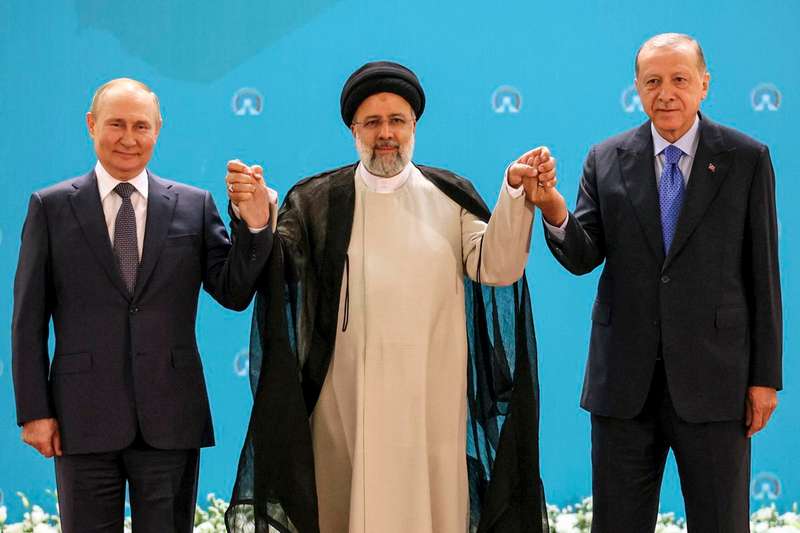
Rebel group Hayat Tahrir al-Sham (HTS) have taken over the Syrian capital driving out the Assad government (The New Arab)
by Mick the Ram
The Assad family has ruled over Syria for 53 years, controlling the country with an iron fist and seemingly untouchable.
However, in a lightning strike in the middle of last week, an Islamist anti-government group called Hayat Tahrir al-Sham (HTS) successfully led a major offensive in the north-west, assisted by allied factions and in just a matter of days they have successfully driven the president out.
Senior army officials claim that Bashar al-Assad has flown out of Damascus heading for an unknown destination, shortly before the rebels arrived in the Syrian capital.
HTS was set up in 2012 under a different name, al-Nusra Front, and pledged allegiance to al-Qaeda the following year. The Islamist militant group had captured the second-largest city, Aleppo with relative ease as the military collapsed.
Upon entering Damascus they immediately headed for the notorious Saydanaya prison – where thousands are known to have been executed in the past – and released detainees being held for their support of opposition to the government.
The UN, US, and the UK, as well as a number of other countries continue to consider HTS as an al-Qaeda affiliate and frequently refer to it as al-Nusra Front. Indeed, the US have named the group’s leader, Abu Mohammed al-Jawlani, as a specially designated global terrorist and offered a $10m reward for information that leads to his capture.
The White House said US President Joe Biden and his team were “closely monitoring the extraordinary events in Syria and staying in constant touch with regional partners”.
Half a century of iron-fisted rule
After his father had ruled for almost three decades, Bashar al-Assad took power in 2000, and in his time in charge he brutally crushed a peaceful, pro-democracy uprising, which ultimately turned into a devastating civil war.
More than half a million people were killed and 12 million were forced to flee their homes. Assad’s government took full control aided by Russia, Iran and Iranian-backed militias.
Conflicts around the world seriously weakened military
However, in recent times the government has become significantly weaker due not only to the effects of war, but also crippling sanctions and destabilizing corruption; plus its allies were preoccupied with other conflicts.
The Iran-backed Lebanese group Hezbollah, which was crucial in helping push back rebels in the early years of the war, had suffered recently from Israel’s offensive in Lebanon. Israeli strikes had also eliminated Iranian military commanders in Syria and of course the on-going troubles in Ukraine have meant that the Russians have been heavily distracted.
The severe reduction in help from these crucial supporters, had left the president’s forces massively exposed.
Surprise offensive
Spotting their opportunity, the rebels took control of most of Aleppo – Syria’s second largest city – on 30 November, only three days after launching their surprise offensive.
Initially Assad vowed to “crush” the rebellion, but this proved to be a hopeful wish rather than an actual military strategy.
HTS declaration to the Syrian people
Once Homs – the third largest city – fell on the evening of 7 December, the writing was on the wall, and very quickly the cities of Deraa and Suweida were taken, as were many of the Damascus suburbs.
Then less than two hours after entering the capital, HTS declared: “The tyrant Bashar al-Assad has fled. After 50 years of oppression under Baath rule, and 13 years of crimes and tyranny and forced displacement we announce today the end of this dark period and the start of a new era for Syria.”
Name change
Hayat Tahir al-Sham was set up in 2012 under a different name, al-Nusra Front, and pledged allegiance to al-Qaeda the following year.
They were regarded as one of the most effective and deadly of the groups ranged against President Assad.
Its jihadist ideology appeared to be its driving force, rather than revolutionary zeal – and it was seen at the time as at odds with the main rebel coalition known as the “Free Syrian Army”.
However, in 2016, al-Nusra broke ties with al-Qaeda and took the name Hayat Tahrir al-Sham when it merged with other factions a year later. The leader Abu Mohammed al-Jawlani, is very much putting himself forward as the figurehead of a post-Assad future in Syria.






0 Comments